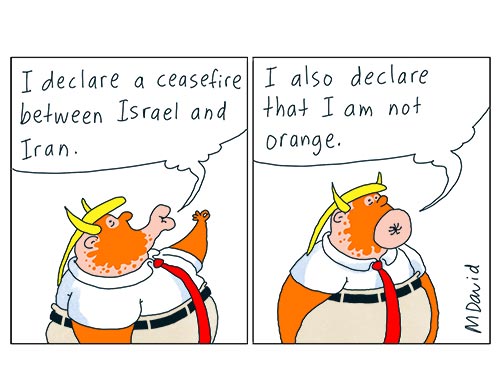As Greta Thunberg joins the Gaza flotilla, her activism forces a global reckoning with denial — from climate to conflict, writes Lyn Bender.
WHEN GRETA THUNBERG switched her visible activism from climate change to Gaza, many saw this as a betrayal of the cause. As she sailed off on the Madleen to break the siege of Gaza on 1 June. Israel intercepted it in international waters. The activists were removed and detained.
Greta Thunberg announced on Instagram that she is set to be part of a second, larger flotilla setting out on 31 August: the Global Sumad Flotilla.
When asked about her concern for climate and also for Gaza, Greta has responded that injustice and failure to act pervade both these spheres.
Once mocked for inspiring school climate strikes, she has annoyed some for not sticking to her cardinal cause.
We can learn much from Greta’s example as she continues to challenge denial.
Denial, as described by Sigmund Freud, is one of several defence mechanisms elaborated upon by post-Freudians.
It has some survival value. As we are increasingly aware of our mortality, we must nevertheless go on with daily life. I am heading out the door, but I could fail to return.
Perhaps phrases like “see you later”, “au revoir” and “auf wiedersehn” have emerged as hopeful incantations.
But denial can be lethal if we fail to protect ourselves. It may save us from immediate anxiety, but its protection has a shelf life. Think of Little Red Riding Hood tripping happily and innocently through the woods. Denial has a few accomplices. Emotional avoidance and numbing, wishful thinking, grandiose optimism, and latching onto false information.
All of these have been on display and exploited during the so-called “climate wars” of the Tony Abbott and Scott Morrison years in Australian politics. Abbott famously won against Julia Gillard on the slogan of ‘Axe the Tax’. He aroused fear about the tax and possibly tapped into the unconscious wish of many to deny the urgency of climate change. Morrison brought a lump of coal into parliament, encouraging people to handle it without fear.
However, truth and reality must eventually invade our consciousness and our world.
As Shakespeare declared in The Merchant of Venice: ‘Truth will out.’
Psychiatrist Elisabeth Kübler-Ross identified stages of grief — denial, anger, bargaining, depression and acceptance. Though these are not strictly linear, our awareness, shock and grief regarding climate change may be seen as in the bargaining stage.
All except the staunchest of deniers now grudgingly concede that climate change is a thing. The argument pursued now centres upon what should be done about it.
Gas versus renewables, nuclear versus sun and wind energy — all these can be seen as delaying tactics. What is being protected here is the status quo. The profiteers can engage the populace in complicity by casting doubt and fear of loss and change.
Remember the claim that electric car technology meant the end of the Aussie ute and weekends?
Those who gain from, for example, tobacco sales and mining of fossil fuels may cast doubt on the veracity of harm or the efficacy of mitigation. The tactic of casting doubt was elaborated in Merchants of Doubt by Naomi Oreskes and Eric M Conway. They described how tobacco and fossil fuel interests muddied the water of the known science to cast doubt on the links between smoking and cancer, and the warming Earth and the burning of fossil fuels.
Noam Chomsky, famous for his writings on linguistics and manufacturing consent, has said:
‘The smart way to keep people passive and obedient is to strictly limit the spectrum of acceptable opinion, but allow very lively debate within that spectrum...’
Since 7 October 2023, all conversation regarding Gaza has required acknowledgment of that date. Which has incidentally achieved a status comparable to 9/11
Debate on the ABC hovers around whether it is or isn't a genocide. What is antisemitism? When Israel is criticised, the Holocaust is invoked. Are the people of Gaza being starved, or is Hamas stealing the food?
Were Al Jazeera journalists targeted illegally, or were they Hamas?
When Israel shoots the messenger, it's frequently not a metaphor.
When protests against genocide are held, they are decried for disrupting traffic and at the same time, discredited as powerless to bring change.
But Greta and other protesters are onto something.
Shakespeare’s Hamlet reenacts the crime committed by his uncle in murdering his father, declaring:
‘The play's the thing, wherein I’ll catch the conscience of the king.’
Pictures of starving skeletal children seem to have been a massive conscience breaker worldwide.
Despite the NSW Government attempting to ban it, tens of thousands protested and marched across the Sydney Harbour Bridge.
This may have pushed Prime Minister Albanese to a more courageous stance and recognition of Palestinian statehood.
The public conversation has shifted.
Peaceful protest is a strong power held within a democracy. It must be respected and guarded.
Gaza is happening now and so are climate floods, fires, displacement and sinking South Pacific Islands.
As Greta has said:
“How can we care about the future when we ignore the suffering of today?”
Lyn Bender is a professional psychologist. You can follow Lyn on Twitter @Lynestel.
 This work is licensed under a Creative Commons Attribution-NonCommercial-NoDerivs 3.0 Australia License
This work is licensed under a Creative Commons Attribution-NonCommercial-NoDerivs 3.0 Australia License
Support independent journalism Subscribe to IA.

Related Articles
- Gaza genocide and the threat of Greta Thunberg
- EDITORIAL: Gaza genocide and the threat of Greta Thunberg
- Why Greta Thunberg really irks some Aussies
- Passing the generational baton for climate change
- Trolling Greta Thunberg: How dare they?














